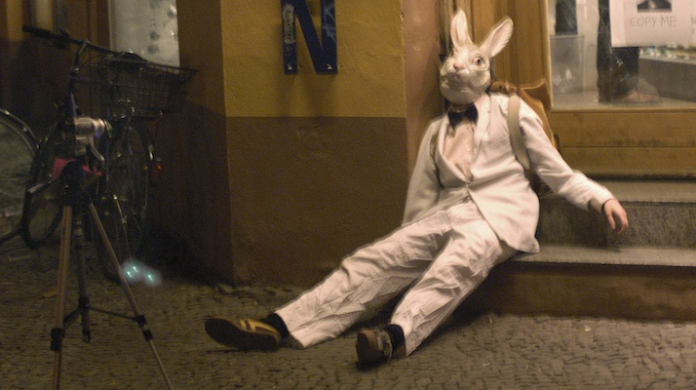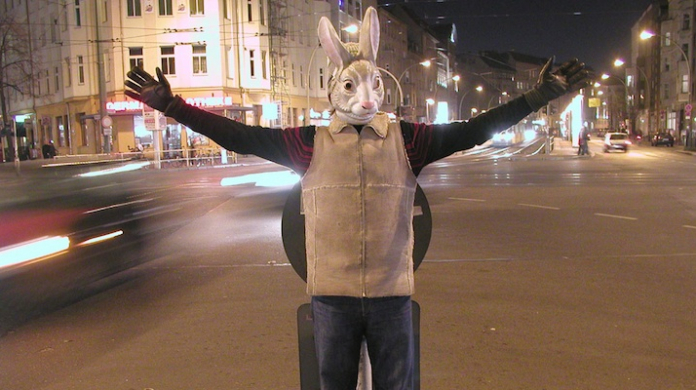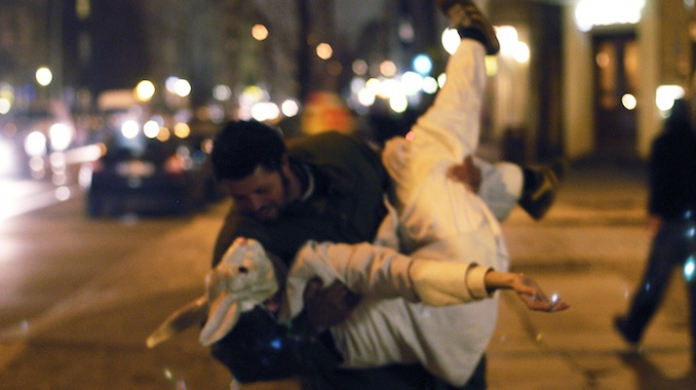Running around a district in a costume and mask brandishing a video camera might not be the easiest way to talk to people, but Mat Hand explains that Gob Squad's show enjoyed real success in Sri Lanka
Seeing the city in a new light
Gob Squad was approached by the Goethe Institute Sri Lanka and asked if we could perform in Colombo. Following extensive negotiations and a partnership/collaboration with British Council Sri Lanka it became possible in February 2014. There's often a planning phase of up to 18 months regarding Gob Squad shows – the calendar is very full with various shows that are either confirmed, pending or requested all over the world.
We take any opportunity to do Super Night Shot in new and interesting cities, but it's not really a question of picking and choosing, it's more about what chances come along and whether it is possible. It depends on the availability of the cast and crew; Gob Squad has seven core members and a pool of guest performers who can perform on its shows. This keeps the casts for all the shows fresh and different in every city, and allows for shows to take place simultaneously in different places. We're always looking at who can or can't do shows as and when they come up.
We were in Sri Lanka as part of the Colomboscope festival. It was focusing on ideas of “making histories”, whether that's to do with literary histories, Internet legacies, ideas of histories in the local area or, in our case, an ephemeral portrait of part of the city, which is essentially what Super Night Shot is. It's a fleeting, video snapshot of a place, lasting for one hour on a particular evening.
We were showing the film in an old cinema called the Rio in Slave Island, which is a district of Colombo. We set up in a back room with our costumes and our cameras, and on the nights of the shows we all (four performers) left the Rio with our video cameras then split up into the local streets. We met people, talked to them on camera as part of the performance and then all met together on a traffic island 45 minutes later, where we staged a romantic filmic kiss moment with a local resident and one of our performers. We then all ran back to the cinema, rewound the tapes and played the four-screen film to the public.
Super Night Shot is always a very intense and enjoyable experience. We're in the city, on the streets, talking to people in shops, riding in taxis, feeling that city for a short period. It’s so liberating and life-affirming to perform it. Sometimes with touring shows you can end up just going between the venue and the hotel, but with Super Night Shot you're so integrated into that very small area of the city for a week. You need to make lots of preparations, see when the shops are open, for example, and you're talking to people all the time. You really feel like you discover the place in a way that you wouldn't as a tourist and you wouldn't if you just arrived to do a show in a theatre.
"Sometimes with touring shows you can end up just going between the venue and the hotel, but with Super Night Shot you're so integrated into that very small area of the city for a week."
Because we're all foreigners when we arrive in a place, we can operate with a naïve faith during the show, which allows us to move around asking questions and doing things that locals couldn’t. We're allowed to ask what's wrong, what's going on and how could things be improved, and in doing so we almost always dig up some kind of truth whether that is a personal issue that resonates or issues of local politics. These lead to a bigger picture of the people and places featured in the film.
In Colombo, for example, we were filming in an area where a whole block was being demolished to make way for a shiny new tower block. They were kicking people out, and that was it. That happens all over the world. It's happening in Berlin, that kind of gentrification is happening everywhere, these kind of local problems happen in a small part of Colombo, too, not just in Berlin or Shoreditch.
There was an incredible openness to the people we met in Slave Island whilst doing the shows. Reactions can differ from city to city when you walk up to someone with a camera and try to talk to them. In Colombo, we found people were very welcoming and even though there were some difficulties due to the language barrier we were able to communicate. Language can sometimes be a problem in the show but there's a universal action-language, and we seem to be able to manage to get through without it becoming too complicated or laboured.
"...someone who had lived in Colombo for years said that the show had helped him see this part of the city and its people in a new light"
We have experienced other cities where people were much more closed and wouldn't talk to us. That can be very difficult. In Colombo we also noticed that there was no real issue with the cameras – sometimes you get people saying “Is this going on YouTube? I don't want you to film me.” There was none of that.
There was a lot of interest in the area in what we were doing. We are all running around in a small area, with costumes and masks, holding tripods and cameras, so we looked pretty strange. Over the time we were there, we developed a kind of following and by the time it came to the final climactic romantic scene on the second show, there were hundreds of people waiting and watching on the traffic island for the kiss scene.
After one of the shows at the Rio Cinema someone who had lived in that area of Slave Island Colombo for years spoke to me afterwards, thanked us for the show and said that it had helped him see this part of the city and its people in a new light. That's always really fantastic for us as performers and makes all the hard work worthwhile.
Gob Squad took its show Super Night Shot to Sri Lanka's Colomboscope Festival as part of a partnership between the British Council and the Goethe Institute. Mat Hand is Touring Manager for Gob Squad, and he was talking to Eleanor Turney.


